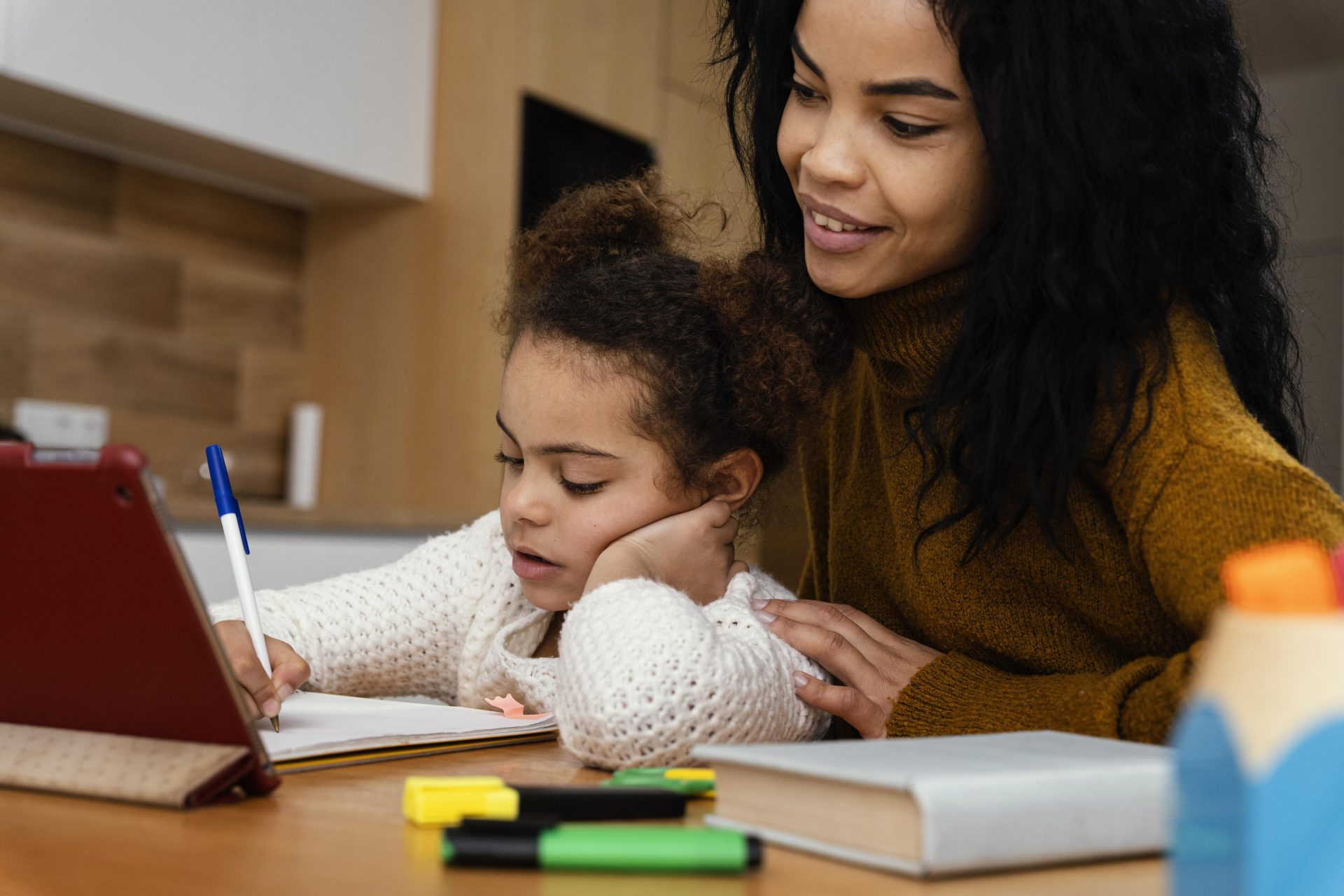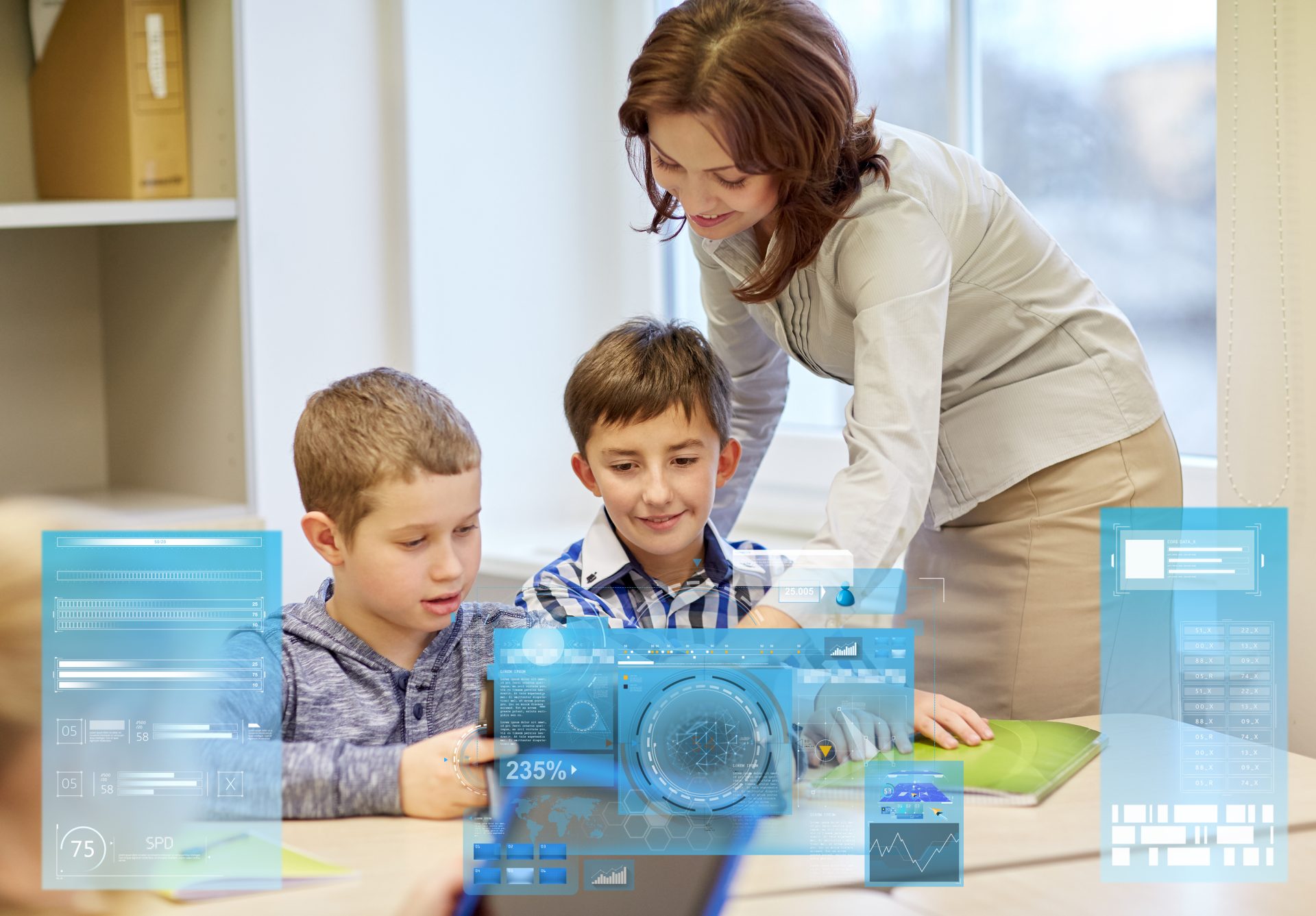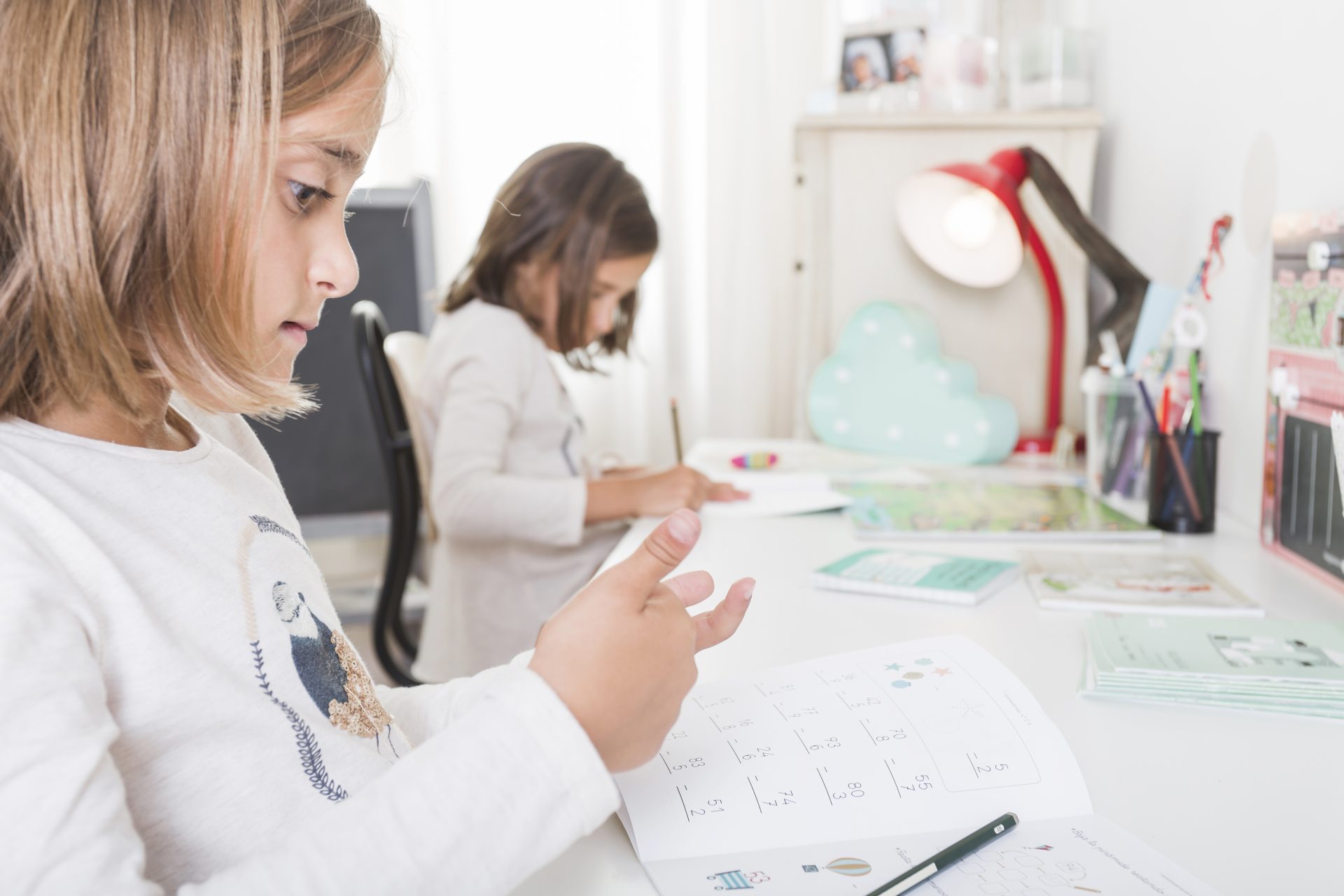Contents
- 1 Pourquoi les compétences sociales sont-elles importantes ?
- 2 Les défis de l’apprentissage en ligne
- 3 Avantages de l’apprentissage en ligne
- 4 Stratégies pour aider les parents à socialiser leurs enfants
- 5 Stratégies des enseignants pour aider les enfants à se socialiser
- 6 Le rôle de la technologie : Médias sociaux et applications
- 7 Conclusion
Les écoles en ligne ont des avantages et des inconvénients. Certains parents pensent que l’acquisition de compétences sociales en ligne est un inconvénient. Ces parents se trompent. Le développement des compétences sociales n’est pas un inconvénient dans un environnement en ligne. Ce développement est simplement différent de celui des écoles traditionnelles. Nous allons expliquer comment les compétences sociales se développent dans les écoles en ligne afin d’aider les parents à mieux comprendre ces différences.

Le développement des compétences sociales consiste à apprendre à interagir correctement avec les autres. Ce développement comprend le travail d’équipe, la communication et la résolution des conflits. Nous verrons pourquoi les compétences sociales sont importantes. Nous verrons comment développer ces compétences dans les écoles en ligne et nous donnerons des conseils pour relever les défis. Nous parlerons de ce que les parents et les enseignants peuvent faire pour aider les élèves à réussir dans l’enseignement en ligne.
Les compétences sociales sont à la base de la croissance émotionnelle et de la réussite personnelle. Les élèves communiquent et nouent des relations grâce à ces compétences. Voici cinq façons dont les compétences sociales aident les élèves :
- Les compétences sociales améliorent l’empathie, la résolution de problèmes et facilitent le travail en équipe
- Les compétences sociales aident les élèves à améliorer leurs résultats scolaires
- Les élèves gèrent efficacement leurs émotions
- Les élèves nouent des amitiés
- Les enfants dotés de compétences sociales solides gèrent mieux le stress
Il est important pour les élèves de développer ces compétences dès le plus jeune âge. Il leur donne les moyens de réussir.
Les défis de l’apprentissage en ligne
L’apprentissage en ligne pose plusieurs défis aux enfants. Nous avons examiné dix défis majeurs de l’enseignement en ligne dans l’article “Surmonter les défis de l’école élémentaire en ligne”. Nous avons proposé des solutions aux parents et aux élèves pour surmonter ces difficultés.
Avantages de l’apprentissage en ligne
L’apprentissage en ligne présente de nombreux avantages pour les enfants. Nous avons abordé dix avantages clés de l’enseignement en ligne dans l’article “Avantages de l’école primaire en ligne”. Comprendre ces avantages aide les élèves et les parents à réussir.

“Après tout, les médias sociaux présentent de nombreux avantages. Par exemple, ils permettent de s’exprimer et de sensibiliser le public à des questions importantes. J’ai réalisé qu’au lieu d’empêcher mes enfants d’utiliser les médias sociaux, je devrais leur apprendre à les utiliser de manière sûre et positive.”
L’interaction sociale dans l’apprentissage en ligne n’est pas sans poser de problèmes. Les parents soutiennent leurs enfants pour s’assurer qu’ils restent socialement connectés. Le soutien parental à l’amélioration de l’engagement social dans l’éducation en ligne comprend plusieurs stratégies. Nous allons aborder cinq stratégies que les parents utilisent pour aider leurs enfants.
Encourager l’adhésion à des clubs et activités virtuels
Encourager la participation des enfants à des clubs virtuels et à des activités extrascolaires en ligne. Ces activités comprennent des clubs de lecture en ligne, des sports virtuels, des clubs de codage, des cours d’art et des leçons de musique.
La Legacy Online School propose aux élèves des activités extrascolaires et des clubs. L’école en ligne Legacy propose des clubs tels que Coding, STEM, Art, et Langue et Culture. Ces clubs aident les étudiants à développer de nouvelles compétences, à explorer leurs centres d’intérêt et à se rapprocher de leurs pairs.
Organiser des réunions virtuelles
Organisez des rencontres virtuelles en utilisant des plateformes d’appel vidéo fiables pour mettre votre enfant en contact avec ses pairs. Utilisez des plateformes telles que Zoom, Google Meet, ou Skype. Veillez à ce que les rencontres soient régulières afin d’aider les enfants à développer des liens sociaux significatifs.
Participer à des communautés en ligne
Trouvez des forums ou des groupes en ligne sûrs et adaptés aux enfants, où votre enfant s’engage avec des camarades qui partagent les mêmes centres d’intérêt. Commencez par trouver des plateformes comme LEGO Life ou Scratch. Ces plateformes disposent d’une forte modération et d’un contrôle parental. Rejoignez la plateforme pour en vérifier la sécurité, puis encouragez votre enfant à la rejoindre. Surveillez l’activité de l’élève, parlez de la sécurité en ligne et fixez des limites de temps pour que l’expérience soit positive.

Organiser des activités de plein air
Organisez de petits rassemblements en plein air ou des réunions de jeux en vous coordonnant avec d’autres familles à une heure et dans un lieu précis. Un parc local ou une arrière-cour sont des endroits idéaux. Assurez-vous que l’espace permet des activités en plein air. Prévoyez des activités telles que des sports, des jeux ou des travaux manuels pour maintenir l’intérêt des enfants. Veillez à ce que le groupe soit restreint afin d’assurer la sécurité et d’encourager les interactions entre les enfants.
Créer un groupe de loisirs communs
Créez un groupe autour d’un hobby commun. Utilisez des applications communautaires telles que Discord pour créer un groupe de loisirs. Invitez des enfants partageant les mêmes centres d’intérêt à rejoindre le groupe de loisirs. Organisez des séances au cours desquelles les enfants partagent leur travail. Il peut s’agir de montrer des dessins, de discuter de projets de codage ou d’examiner des livres. Organisez des discussions qui incitent les enfants à poser des questions et à donner leur avis les uns aux autres. Veillez à ce que le groupe dispose de lignes directrices claires afin de favoriser un environnement favorable aux enfants.
Les enseignants favorisent l’interaction par le biais de travaux de groupe, de discussions et de travaux d’équipe virtuels. Les enseignants améliorent l’engagement social en utilisant des activités structurées et des forums en ligne. Nous présentons cinq stratégies utilisées par les enseignants pour stimuler l’interaction sociale dans l’apprentissage en ligne.
Créer des activités de groupe
Organisez des projets de groupe et des activités où les élèves collaborent. Utilisez des outils tels que Discord ou Padlet pour créer des tâches collaboratives. Répartissez les élèves en petites équipes avec des objectifs clairs et précis. Attribuez un rôle à chaque élève pour garantir une participation égale. Utilisez des rôles tels que leader, chercheur ou présentateur. Surveillez le travail des élèves et donnez-leur un retour d’information. Ces activités encouragent le travail d’équipe et la communication, car les élèves travaillent ensemble pour atteindre un objectif commun.
Encourager les discussions
Utilisez des outils tels que Zoom pour créer des salles de réunion structurées. Ces salles permettent à de petits groupes d’étudiants de discuter de sujets. Les séances en petits groupes garantissent la participation active des élèves et permettent une communication ciblée. Établissez des règles claires pour un comportement respectueux. Cela permet de s’assurer que chaque élève s’exprime sans être interrompu.
Utilisez des plateformes telles que Google Classroom pour créer des forums de discussion où les élèves affichent leurs idées et répondent aux autres. Les forums de discussion sont idéaux pour les élèves qui n’osent pas prendre la parole lors de sessions en direct.
Promouvoir le travail d’équipe
Attribuez des projets de groupe dans lesquels chaque étudiant a un rôle spécifique. Utilisez des plateformes telles que Google Docs ou Microsoft Teams pour permettre aux étudiants de collaborer en temps réel. Fixez des objectifs et des échéances clairs afin de responsabiliser les élèves. Fournissez régulièrement un retour d’information pour guider les progrès de l’équipe et vous assurer que chaque enfant contribue à la tâche. Cette structure aide les élèves à apprendre à travailler ensemble, à résoudre des problèmes et à se soutenir mutuellement.
Planifiez le temps social en prévoyant des pauses courtes et non structurées au cours de la journée scolaire. Les élèves profitent de ces pauses pour interagir sans pression scolaire. Utilisez des outils tels que Gather pour créer des espaces virtuels où les élèves discutent et engagent des conversations spontanées. Encouragez la participation des élèves à des activités occasionnelles. Ces activités comprennent des jeux virtuels ou des quiz via Kahoot ou Quizlet Live pour favoriser la création de liens.
Créez des sessions à thème, telles que « Show and Tell » ou « Fun Friday ». Les élèves utilisent ces sessions pour partager des histoires personnelles, des passe-temps ou des expériences. Cette formule aide les élèves timides à s’ouvrir dans un environnement détendu, ce qui leur permet d’acquérir une certaine confiance en eux et de renforcer les relations entre pairs.
Créer des systèmes de parrainage
Créez un système de jumelage en associant les élèves pour une semaine ou un projet spécifique. Attribuez les binômes de manière intentionnelle, en associant des élèves qui n’ont pas eu beaucoup d’interactions auparavant. Définissez clairement les rôles des élèves. Il peut s’agir de s’entraider pour les devoirs, de discuter des sujets abordés en classe ou simplement de s’entraider pendant les cours.
Utilisez des plateformes telles que Google Classroom ou Miro
pour faciliter la collaboration entre les élèves. Encouragez les échanges entre camarades par le biais de chats ou d’appels vidéo. Proposez aux élèves de petites tâches à réaliser ensemble. Il peut s’agir de réviser le travail de l’autre ou de résoudre des problèmes en équipe.
Incorporez des discussions à la fin de la semaine au cours desquelles les copains partagent ce qu’ils ont appris en travaillant ensemble. Cette réflexion les aide à reconnaître la valeur de leur partenariat et renforce leur aisance à socialiser avec leurs camarades de classe.
Faites tourner régulièrement les binômes afin d’élargir les réseaux sociaux et d’encourager l’interaction avec différents camarades tout au long de l’année scolaire.
Les enseignants de la Legacy Online School viennent d’horizons différents. Ils savent comment motiver les enfants et les aider à réussir.
Le rôle de la technologie : Médias sociaux et applications

|
Des statistiques clés à ne pas manquer
46 % des adolescents américains ont déclaré que les médias sociaux avaient un effet positif sur eux. Cela s’explique par le fait que les adolescents ont la possibilité de se connecter et de socialiser sur ces services. Ces statistiques ont été présentées par Statista.
|
Comprendre la technologie est essentiel pour les parents et les enseignants. Savoir comment la technologie affecte l’interaction sociale les aide à tirer le meilleur parti de l’apprentissage en ligne. Nous examinerons cinq stratégies pour les aider à utiliser la technologie de manière efficace.
Encourager une utilisation équilibrée
Les parents et les enseignants doivent aider les élèves à utiliser les applications de manière équilibrée. Nous avons sélectionné quatre groupes d’applications pour les aider dans cette tâche :
-
Apple Screen Time ou Google Family Link pour fixer des limites de temps et gérer une utilisation équilibrée des applications
-
Forest ou Focus@Will pour aider les élèves à rester concentrés sur les tâches scolaires
-
RescueTime pour suivre le temps passé sur différentes applications et sites web
Promouvoir les applications éducatives
Utilisez Duolingo
pour aider les élèves à apprendre les langues grâce à des leçons interactives. Ces leçons sont axées sur le vocabulaire, la grammaire et la prononciation.
Utilisez des applications comme ABCmouse ou Reading Eggs pour aider les élèves à lire et à apprendre les mathématiques de base à l’aide de jeux interactifs amusants. L’utilisation de ces applications aide les élèves à étendre leur apprentissage au-delà de la salle de classe et à rester motivés.
Surveiller le comportement en ligne
Les parents et les enseignants discutent ouvertement avec les élèves d’un comportement responsable en ligne. Les parents et les enseignants expliquent l’importance de la gentillesse, de la protection de la vie privée et de l’évitement des interactions à risque.
Utilisez des outils comme Bark ou Qustodio
pour suivre l’activité des élèves, signaler les contenus inappropriés et fixer des limites à l’utilisation des applications. Ces outils envoient des alertes lorsqu’un comportement potentiellement dangereux est détecté. Ces comportements nuisibles comprennent la cyberintimidation ou l’exposition à des contenus inappropriés.
Encouragez les élèves à utiliser les paramètres de confidentialité sur des plateformes comme Instagram, TikTok, ou Snapchat. Rappelez aux élèves d’éviter de partager des informations personnelles et de signaler toute interaction négative à un adulte de confiance.
Utiliser les groupes de médias sociaux
Des plateformes telles que Facebook Groups ou Reddit permettent aux étudiants de rejoindre des communautés où ils discutent de sujets, posent des questions et partagent des ressources. Encouragez les élèves à participer à des groupes éducatifs ou à des groupes d’intérêt afin d’améliorer leur expérience d’apprentissage.
Utiliser des applications pour la collaboration
Seesaw est une plateforme conviviale sur laquelle les élèves téléchargent leurs travaux, répondent aux devoirs et s’échangent des commentaires. Cette application favorise l’apprentissage interactif et permet aux enseignants de suivre facilement les progrès des élèves.
ClassDojo est une application qui permet de créer un sentiment de communauté dans la classe. Les enseignants partagent leurs annonces et les élèves publient des mises à jour sur leurs projets. Les parents surveillent la participation de leur enfant, ce qui en fait un outil de collaboration.
Flipgrid est une application qui offre aux élèves un moyen amusant de communiquer entre eux par le biais de courtes réponses vidéo. Cette application est parfaite pour les discussions de groupe, les commentaires des pairs ou les présentations virtuelles.
Jamboard est un tableau blanc numérique. Ce tableau blanc permet aux élèves de travailler ensemble en temps réel sur des tâches créatives ou des brainstormings. Cette application est idéale pour les apprenants visuels et rend la collaboration interactive et attrayante.
Wakelet est une application qui aide les élèves à collecter et à organiser des ressources pour leurs projets. Les élèves travaillent ensemble pour rassembler des recherches, des articles ou des images. Cet outil est parfait pour la recherche collaborative et les présentations.
Conclusion
L’interaction sociale est importante pour le développement des enfants. L’engagement social aide les élèves à développer la communication, le travail d’équipe et les compétences émotionnelles. Nous avons examiné les avantages et les inconvénients de l’enseignement en ligne pour les élèves. Nous avons étudié le rôle des parents, des enseignants et de la technologie pour aider les enfants à développer leurs compétences sociales. Nous avons partagé des stratégies utilisées par les parents et les enseignants pour créer un environnement social positif pour l’apprentissage.










